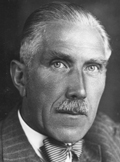 |
Franz Joseph Hermann Michael Maria von Papen
b. 29 Oct 1879, Werl, German Reich
d. 2 May 1969, Obersasbach, West Germany |
| Title: |
Reichskanzler (Reich Chancellor) |
| Term: |
1 Jun 1932 - 3 Dec 1932 |
| Chronology: |
1 Jun 1932,
appointed, order issued by the Reich President on 1 Jun 1932
[1] |
|
2 Jun 1932,
took an oath of office as Reich Chancellor, swearing-in ceremony, Berlin [2] |
| |
17 Nov 1932,
resignation submitted to the Reich President, accepted pending the appointment of a successor [3] |
| |
3 Dec 1932,
discharged, order issued by the Reich President on 3 Dec 1932
[4] |
| Names/titles: |
Erbsälzer zu Werl und Neuwerk [hereditary title in the town of Werl, now in North Rhine-Westphalia, Germany] |
| Biography: |
| Attended Bensberg cadet academy (1891-1895), Berlin-Lichterfelde military academy (1895-1898), Dusseldorf and Hanover cavalry schools (1898-1908); served as a page at the Prussian court; commissioned in a Uhlan regiment as lieutenant (1898); completed his education at the Berlin staff academy (1908-1913) and was promoted to captain (1913); entered diplomatic service as a military attaché to the German ambassador in the United States (1913-1915), arriving to Washington, D.C. in early 1914; was declared persona non grata for espionage and recalled to Germany (1915); served as battalion commander in the West front and was promoted to major (from 1917); joined the German Asia Corps, combined with an Ottoman army, as chief of staff in Palestine; discharged from the army with the rank of lieutenant colonel (1919); joined the ultra-conservative wing of the German Centre Party (Deutsche Zentrumspartei, commonly known as Zentrum); elected to the Landtag of Prussia (1921–1928, 1930–1932); served as chairman of the steering committee of Germania, newspaper of the Zentrum Party (1923); appointed Reich Chancellor (1 Jun 1932 - 3 Dec 1932) and broke with the Zentrum (3 Jun 1932); in an attempt to appease the Nazis, he lift a ban on the functioning of the Nazi paramilitary organization, the Sturmabteilung (SA); convinced the Reich President to remove the Social Democratic government of Prussia and was made Reich Commissioner for the Land of Prussia (Reichskommissar für das Land Preußen 20 Jul 1932 - 3 Dec 1932, 30 Jan 1933 - 11 Apr 1933); attended the Lausanne Conference (16 Jun 1932 - 9 Jul 1932) and succeeded in canceling Germany's post-war reparations; member of the Reichstag (1933-1945); served as Deputy Reich Chancellor (Stellvertreter des Reichskanzlers 30 Jan 1933 - 11 Aug 1934) and Plenipotentiary of the Reich Chancellor for the Saar (Saarbevollmächtigten des Reichskanzlers, 14 Nov 1933 - 11 Aug 1934); briefly arrested after the Röhm putsch (1934); served as extraordinary envoy and plenipotentiary minister on a special mission in Vienna (1934-1936); extraordinary ambassador and plenipotentiary minister to Austria (1936-1938); ambassador to Turkey (1939–1944); acquitted at the Nuremberg Trials (1946); reclassified as a war criminal (1947) by a German de-Nazification court, and sentenced to eight years' hard labor; acquitted after serving two years. |
| Biographical sources: Reichstags-Handbuch. VIII. Wahlperiode. 1933. Berlin: 1933. S. 217; Reichstags-Handbuch. IX. Wahlperiode. 1934. Berlin: 1933. S. 272; Der Deutsche Reichstag. 1936. III. Wahlperiode nach dem 30. Januar 1933. Berlin: 1936. S. 254; Der Grossdeutsche Reichstag 1938. IV. Wahlperiode (nach dem 30. Januar 1933). Berlin: 1938. SS. 335-336. |
| |
| [1] |
Bundesarchiv, R 43 I/1309, fl. 85. |
| [2] |
Akten der Reichskanzlei, op. cit., Band 1, S. XXII: "Schon am Nachmittag des 2. Juni waren, abgesehen vom Arbeitsressort, alle Ministerien neu besetzt und die Vereidigungen durch den Reichspräsidenten vorgenommen..." |
| [3] |
Akten der Reichskanzlei, op. cit., Band 2, S. 964: "Der Reichskanzler berichtete, daß er dem Herrn Reichspräsidenten die Demission des Kabinetts angeboten habe. Der Herr Reichspräsident habe die Demission auch angenommen und an das Reichskabinett die Bitte gerichtet, die Geschäfte weiter zu führen. {Footnote}: Über diese Besprechung, die am Nachmittag des 17. 11. stattgefunden hatte, verbreitete WTB die folgende amtl. Mitteilung: Der RK erstattete dem RPräs. Bericht über das Ergebnis der Verhandlungen, „die er im Auftrage des Herrn Reichspräsidenten mit den Parteiführern zur Erzielung einer möglichst breiten nationalen Konzentration gepflogen hat. <...> Der Herr Reichspräsident nahm die Demission der Reichsregierung entgegen und beauftragte das Kabinett mit der Weiterführung der Geschäfte.“ (WTB-Nr. 2466 vom 17.11.32 in R 43 I/1309, S. 625; dort auch mehrere Entwürfe dieser Verlautbarung." |
| [4] |
Bundesarchiv, R 43 I/1309, fl. 589. |

